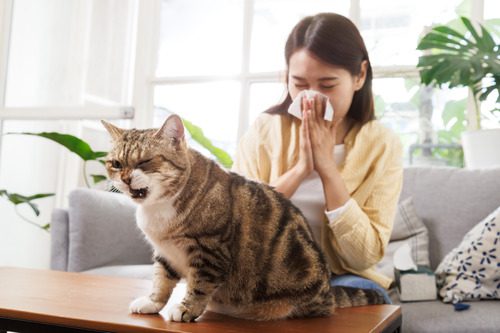Cat Coughing: Causes And What To Do
When your cat starts coughing, it can be startling—and understandably so. Coughing is not nearly as common in cats as it is in dogs, which makes it all the more alarming when it happens. A single cough might seem harmless, but persistent or recurring coughing often points to an underlying issue that needs attention. Whether the cause is minor or more serious, recognizing the potential reasons behind cat coughing can help you know when to seek veterinary care. If your cat is coughing and you’re not sure what to do, this blog will walk you through the most common causes and when it’s time to contact your veterinarian for help. If your cat is experiencing a sudden or severe coughing episode, call The Village Vets – 24 Hour Emergency in Atlanta right away at (404) 371-9774.

Why Is My Cat Coughing?
Coughing in cats can stem from several different sources. In some cases, the issue may be short-term, like a minor irritation. In others, it could point to an underlying respiratory or systemic problem. Cats use coughing as a reflex to clear their airways, just as humans do—but unlike sneezing, it usually signals something more serious. It’s important to consider how often your cat is coughing, whether it’s dry or productive (with phlegm), and if other symptoms are present. Below, we break down the most common reasons a cat might be coughing.
Respiratory Infections
Upper and lower respiratory infections are among the most common causes of cat coughing. These infections can be viral, bacterial, or fungal, and may affect the nasal passages, throat, or lungs. Coughing occurs when the body tries to clear mucus or infectious material from the airways.
Viral Infections
Feline herpesvirus and calicivirus are two of the most frequently diagnosed viral infections in cats. These viruses can cause coughing, sneezing, nasal discharge, and fever. While some cats recover with supportive care, others may need veterinary intervention—especially if coughing worsens or is accompanied by lethargy and loss of appetite.
Bacterial Infections
Bordetella bronchiseptica, though more common in dogs, can also infect cats—particularly those in shelters or multi-cat households. Mycoplasma is another bacterial pathogen known to affect the respiratory tract. If a bacterial infection is suspected, your veterinarian can recommend diagnostics and treatment.
Fungal Infections
Though less common, fungal infections such as Cryptococcus or Aspergillus can affect the lungs and trigger coughing in cats. These infections often require specific antifungal medications and close monitoring, as they can be difficult to resolve without veterinary care.
Asthma and Allergic Bronchitis
Feline asthma is a chronic condition that causes inflammation and narrowing of the airways. This inflammation makes it difficult for air to pass through the lungs, resulting in coughing, wheezing, and labored breathing. Cats with asthma often cough in a hunched position with their necks extended—something that’s easy to mistake for retching or hairball behavior.
Triggers and Symptoms
Common asthma triggers include:
- Dust
- Smoke
- Pollen
- Mold
- Certain cleaning products
The coughing can be dry or accompanied by mucus, and episodes may range from mild to severe. If left untreated, asthma can worsen over time and impact your cat’s quality of life.
Diagnosing Feline Asthma
Your veterinarian may use chest X-rays, airway sampling, and bloodwork to help diagnose asthma. While the condition is not curable, it can often be managed successfully with medications and environmental adjustments.
Hairballs or Gastrointestinal Irritation
It’s a common belief that cats cough up hairballs, but in reality, the process more closely resembles vomiting or retching than true coughing. However, excessive hair accumulation in the digestive tract can sometimes lead to coughing if hair irritates the throat or airway during regurgitation.
Hairball Frequency
While occasional hairballs are normal for most cats, frequent hairball episodes that include coughing or gagging may indicate an underlying grooming issue or gastrointestinal problem. Long-haired breeds are especially prone to hairball buildup, and increased shedding seasons can exacerbate the problem.
Heart Disease
Certain types of feline heart disease—particularly congestive heart failure—can lead to fluid buildup in or around the lungs. When this happens, a cat may begin coughing, often accompanied by difficulty breathing, weakness, or decreased activity.
Additional Signs to Watch For
In addition to coughing, cats with heart disease might exhibit:
- Open-mouth breathing
- Rapid respiration
- Blue-tinged gums
These are signs of a medical emergency and should prompt immediate veterinary care.
Foreign Objects in the Airway
If your cat suddenly begins coughing violently, especially after playing with small toys or chewing on household items, a foreign object might be lodged in the throat or windpipe. This can block airflow and lead to distress.
What to Look For
Choking, pawing at the mouth, and excessive salivation may accompany coughing caused by a foreign object. This situation can quickly become life-threatening, so it’s vital to seek emergency veterinary assistance right away if you suspect your cat is choking.
Parasites That Affect the Lungs
Certain internal parasites, such as lungworms or heartworms, can trigger coughing in cats. Lungworms are transmitted through ingestion of infected prey or exposure to contaminated environments. Heartworms, though more commonly associated with dogs, can still infect cats and cause severe respiratory symptoms.
Preventive Care Matters
Regular parasite prevention helps protect your cat from these dangerous infestations. In cases where a parasite-related cough is suspected, your veterinarian will likely recommend diagnostic testing to identify the culprit and determine the best treatment plan.
What You Can Do as a Pet Owner
While you should always avoid attempting treatments at home, there are steps you can take to monitor your cat’s symptoms and support their well-being. Note how often the coughing occurs, whether it happens during or after activity, and if any other changes in behavior accompany it. Sharing these observations with your veterinarian can help guide their examination and diagnosis. If your cat is coughing and you’re not sure why, don’t wait for it to get worse. Early evaluation can make a big difference in your cat’s comfort and health. For prompt, compassionate care in the Atlanta area, contact The Village Vets – 24 Hour Emergency.
When Should You Seek Veterinary Care for Cat Coughing?
If your cat coughs more than once or twice in a short period, or if the coughing continues over several days, it’s time to contact your veterinarian. Coughing that occurs along with difficulty breathing, wheezing, lethargy, or loss of appetite warrants prompt medical attention.
Because coughing can signal a wide range of conditions, from mild irritation to serious illness, diagnostic testing is often necessary to determine the cause. Our veterinarians at The Village Vets – 24 Hour Emergency in Atlanta are available around the clock to evaluate and treat your cat if coughing becomes concerning. Call (404) 371-9774 to speak with a member of the emergency care team.

